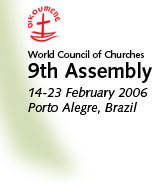 |
WCC > Home > Programme > Spiritual life > Bible studies | ||||
| About the assembly | Programme | Theme & issues | News & media | |||||
 |
|
||||
|
Participating in Bible study
Hand in hand - so that we may have days of grace Luke 4: 16-30; Isaiah 61: 1-4 The proclamation of the "year of the Lord" is God's answer to the prayer of the Assembly theme. Luke 4 is Jesus' (or the Spirit's) manifesto, setting the priorities for his ministry and the church's mission, and has particular resonance in Latin America. Jesus' sermon links pneumatology with transforming justice, good news to the poor, healing and liberation. Jesus preaches that Isaiah 61 is valid from now on, at any time and for all time, and it includes all people. That last point created a major conflict between Jesus and the people, especially the leaders of that time, foreshadowing the cross. "New heavens and a new earth" Isaiah 65: 17 -25; Revelation 21: 1-8 God's creative and transforming power makes all things new, now and in the future. The focus of Isaiah 65 is on justice, peace, and life in abundance as a realistic and medium-term hope, expressed in socio-economic and political terms, while also pointing to a reality beyond the horizons of history. Revelation 21 extends the hope to a coming fullness of communion with God, overcoming even death, without however neglecting to link God's free gift to ethical challenges for a transformation of individual lives. "God shows no partiality" Jonah 4: 1-11; Acts 10: 9-35 The book of Jonah is a story about the transformation of a "foreign people" (near today's Baghdad) and even of God, whose grace surpasses all understanding, in particular the understanding of Jonah himself and that of "God's people". Consequently, the passage challenges our understanding of and approach to people of other cultures and religions. Acts 10 echoes Jonah: Peter's transformation not only changes his attitude, but will make him instrumental in modifying the church's mission. Both texts show how, through encounters with others and with God, the fundamentals of our faith may be questioned. The world of untouchables in India Philippians 2 : 1 - 11; Mark 10: 32 - 45 The hymn of Philippians 2 celebrates the incarnation as Christ's kenosis (or self-emptying) and identification with suffering humanity, with the humble and humiliated. The message of cross and resurrection is at the centre of the New Testament message of God's grace, and the centre also of the transformation this implies for traditional views about God and God's messengers. Philippians 2 also calls for a change in the disciples' life-style, and in relationships within the community of the church (v.4: "let the same mind be in you that was in Christ Jesus"). Other conclusions from Christ's self-emptying approach appear in the parallel text from Mark's gospel, which contains a fundamental critique of the use of power by political authorities, and a challenge to the church to consider an alternative use of power as one of its essential marks (v.43: "it is not so among you"). "My grace is sufficient for you" II Corinthians 12: 6-10; Ezekiel 36: 26-27 We wanted to include one of the major Pauline texts on grace, without however falling into the denominational debate on "grace and law". Second Corinthians 12 links the experience of God's grace and empowerment with human vulnerability which can refer here both to persecution (or martyrdom) and to illness. Grace does not eliminate suffering, but transforms it. The text is central also for a link between the assembly theme and the Decade to Overcome Violence's focus on the use, abuse and misuse of power. Second Corinthians can be read as a fulfilment of the promise of God's Spirit announced in Ezekiel 37, with an emphasis on costly grace. In the Latin American context, 2 Corinthians is an important antidote to the theology of prosperity. Water and the well springing to eternal life John 4: 1-42; Ezekiel 47: 1-12 New insights can be drawn from the dialogue between Jesus and the Samaritan woman when it is read in relation to the Assembly theme. Jesus announces and embodies God's gift of grace through his attitude to and dialogue with the woman. This leads to a transformation of her life, but also of the life of the community of that Samaritan town. It also presents quite a challenge to his disciples. Jesus' message also implies a change in the understanding of what is meant by worshipping God. Ezekiel's extraordinary vision of the water flowing from God's temple has similarities with John 4. The water has transforming and healing power, and brings life in fullness. "In God's word I hope" Psalm 130; 2 Corinthians 3:18 Psalm 130 is traditionally referred to as de profundis. It is a prayer of desperation and of hope, out of an extreme situation of social, economic or personal suffering, and it counts on God's forgiveness and grace. It offers a parallel to the Assembly theme, and raises questions about our understanding of God, our expectations of God and the link with our own commitment and engagement. Second Corinthians 3:18 is a classical text on transformation or, more precisely, transfiguration (metamorphosis), and can appear as the challenging response to the prayer of the psalm. The freedom given by the Spirit, which illuminates communion with God, continually transforms human lives as they grow towards perfection. That grace may abound |
||||||||||||||||||||||||||||||||
|
|
|
||||||||||||||||||||||||||||||||



